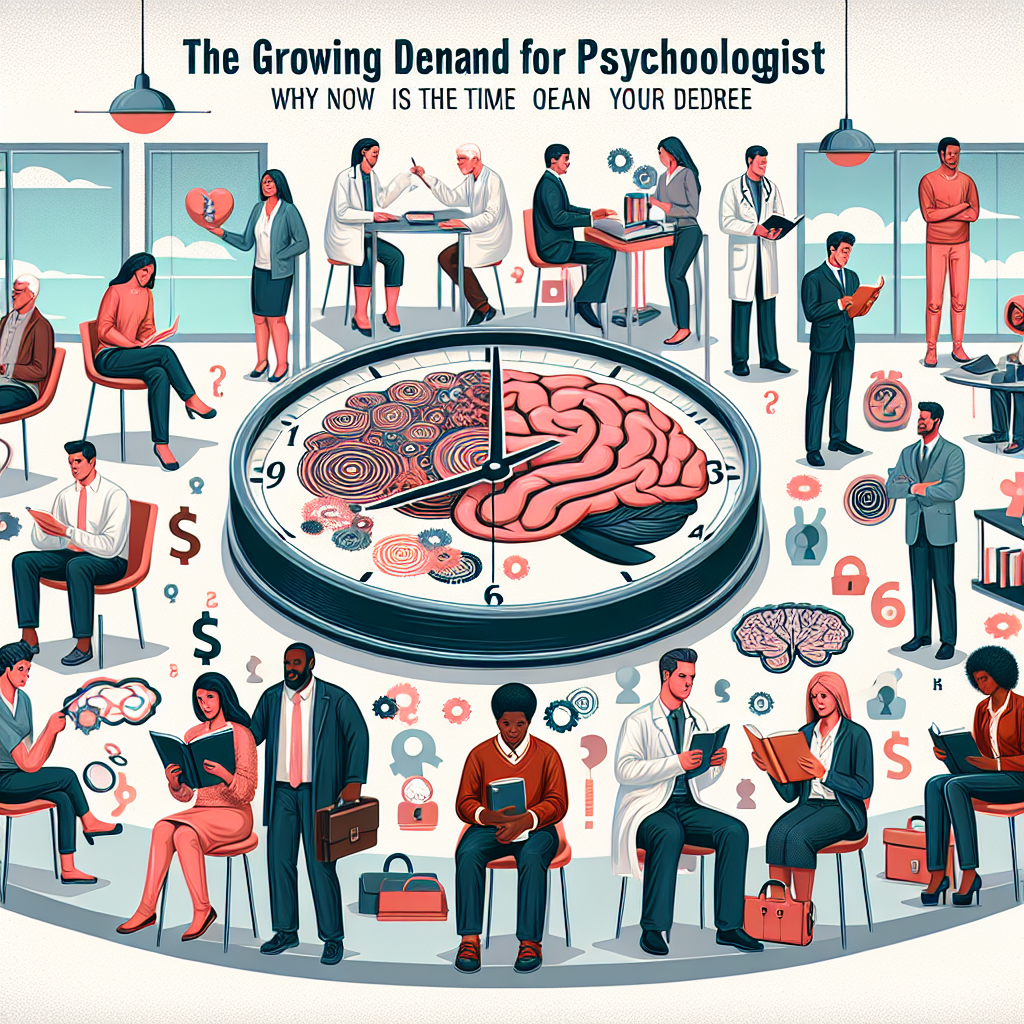
Introduction
In a world increasingly aware of mental health, the growing demand for psychologists has never been more pressing. As we grapple with the effects of a global pandemic, social upheaval, and a cultural shift toward mental wellness, mental health professionals are stepping into a vital role. If you’re considering your future and have a desire to make a meaningful impact, now is the time to earn your degree in psychology. In this article, we’ll delve into the reasons driving this demand, explore real-world applications, and equip you with insights to help you navigate this dynamic field.
Understanding the Growing Demand for Psychologists
The Mental Health Crisis: A Wake-Up Call
Recent statistics reveal that mental health issues are on the rise. According to a report from the World Health Organization (WHO), one in four people will be affected by mental or neurological disorders at some point in their lives. This alarming figure only highlights the urgency of addressing mental health needs. The stigma surrounding mental health is waning, and people are now more open to seeking help, creating a greater demand for trained professionals who can assist them.
Case Study: Implementing Mental Health Programs in Schools
In one progressive school district in California, a mental health initiative was developed to address student anxiety and depression. By employing school psychologists, the district reported a 30% decline in overall student issues. This success underscores the critical need for psychologists not only in clinical settings but also in educational environments.
The Increasing Recognition of Mental Wellness
Corporations and organizations are increasingly investing in mental wellness programs for their employees. From tech giants like Google to startups, companies are recognizing the direct correlation between employee mental health and productivity. This trend translates to more job opportunities for psychologists specializing in industrial-organizational psychology.
Telehealth: A Boon for Psychologists
Teletherapy has gained tremendous popularity, particularly during the COVID-19 pandemic. With many individuals preferring to seek help from the comfort of their homes, psychologists are harnessing technology to reach more clients than ever. Individuals seeking therapy now have more options, creating a growing market for psychological services.
Table 1: Telehealth Usage Before and After COVID-19
| Month | Percentage of therapists offering telehealth |
|---|---|
| January 2020 | 15% |
| April 2020 | 85% |
| January 2021 | 65% |
| Current (2023) | 50% (Still significantly higher than pre-pandemic) |
Career Opportunities in Psychology
Diverse Specializations
The field of psychology offers various career paths, from clinical psychology to sports psychology. Understanding these diverse areas allows prospective students to tailor their education according to their interests.
Popular Specializations:
- Clinical Psychology: Focuses on assessing and treating mental disorders.
- Industrial-Organizational Psychology: Works within corporate settings to improve employee well-being.
- Neuropsychology: Studies brain-behavior relationships, often doing work with brain injury or neurodevelopmental disorders.
Job Outlook and Salary Potential
According to the U.S. Bureau of Labor Statistics, employment for psychologists is projected to grow by 8% from 2021 to 2031. Demand for psychological services is increasing as awareness of mental health rises.
Table 2: Job Outlook and Median Salaries for Psychologists
| Specialization | Projected Growth | Median Salary (2021) |
|---|---|---|
| Clinical Psychology | 8% | $81,000 |
| Industrial-Organizational Psychology | 12% | $86,000 |
| School Psychology | 10% | $79,000 |
| Neuropsychology | 8% | $90,000 |
Why Now is the Time to Earn Your Degree
Increased Access to Education
Online degree programs make it easier for individuals to pursue a psychology degree without geographical constraints. Many accredited institutions now offer comprehensive online programs, allowing flexibility for working professionals.
Scholarships and Financial Assistance
Many universities are increasing scholarships specifically for psychology students. Financial aid options are more robust than ever, making education in this field more accessible.
Professional Development
With the rise of continuous professional development, psychologists can enhance their skills and knowledge through workshops, lectures, and seminars. As psychology evolves with new research, staying updated benefits both practitioners and their clients.
Case Study: Continuing Education for Mental Health Professionals
A study by the American Psychological Association found that psychologists who engage in regular professional development demonstrate improved client outcomes. This continual growth not only enhances their practice but solidifies their role as important contributors to mental health.
The Importance of Ethical Practice
Understanding Ethics in Psychology
The psychological landscape is ever-changing, and ethical considerations must remain at the forefront. Training in psychology includes in-depth discussions on ethics to ensure that future psychologists are equipped to navigate complex situations.
Building Trust in Client Relationships
An ethical approach fosters trust, a crucial element in the therapist-client relationship. Building rapport and maintaining confidentiality are essential components of effective therapy.
Conclusion
The growing demand for psychologists is evident; as we create a society that values mental health, a fulfilling and impactful career awaits. By earning your degree now, you not only position yourself for stable job prospects but also align yourself with a cause that improves lives every day.
With various specializations, increasing access to education, and a strong job outlook, there’s no better time to embark on your journey in psychology. This is your invitation to contribute to a crucial field that provides essential support to individuals and communities alike.
FAQs
1. What are the educational requirements for becoming a psychologist?
Typically, becoming a psychologist requires a doctoral degree, such as a Ph.D. or Psy.D., along with supervised clinical experience and licensure.
2. What job opportunities are there for psychology graduates besides clinical work?
Psychology graduates can work in various settings, including schools, corporate environments, research institutions, and private practice. Specializations like industrial-organizational psychology or forensic psychology are also viable paths.
3. How is teletherapy affecting the psychology field?
Teletherapy has expanded access to psychological services, enabling psychologists to reach clients who may not have sought traditional in-person therapy. It has become a permanent aspect of many practices.
4. What resources are available to help psychology students find scholarships?
Most universities have financial aid offices that can assist with finding scholarships specific to psychology students. Websites like Fastweb and the College Board also offer extensive scholarship databases.
5. How can I ensure I choose the right specialization in psychology?
Consider your interests, strengths, and career goals when exploring specializations. Speak with mentors, look for internships or volunteer opportunities, and take introductory courses in different areas of psychology.
This article has provided an overview of The Growing Demand for Psychologists: Why Now is the Time to Earn Your Degree. Embrace this opportunity to contribute meaningfully while pursuing a fulfilling and rewarding career in psychology.

















